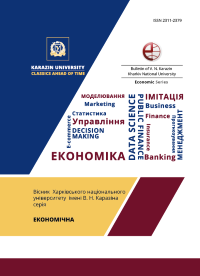Development of theoretical and methodological approaches to organizing the process of creating ESG reports at enterprises
Abstract
The ESG concept (Environmental, Social, Governance) represents ecological, social, and governance indicators that play a crucial role in numerous sustainable development initiatives. The categorization into three spheres stems from the prevailing global consensus approach aimed at effectively realizing sustainable development. This approach is now referred to as ESG activity, emphasizing the pivotal role that enterprises play in addressing various existing challenges. A study of the level of information disclosure regarding the ESG activity of Ukrainian companies, conducted by The Corporate Governance Professional Association) and the Center for CSR Development Ukraine, showed that as of 2020, only about 20% of the companies they studied published reports that can be classified as ESG reporting , but the fact that in 2019 there were only about 10% of such companies is positive, that is, there is a trend towards an increase in the volume of this kind of reporting. It should be noted that the level of transparency of Ukrainian companies in matters of covering their ESG activity is extremely low. In part, such a weak level of involvement can be explained by the fact that Ukrainian companies generally ignore the processes related to the Sustainable Development Goals (SDGs) achievement - the formation of new approaches to the development of humanity based on a certain set of basic values: the fight against poverty, environmental sustainability, health care efforts, as well as the formation of a global partnership for the purpose of development. An important element of the company's ESG activity management system is communication with stakeholders, which is provided through ESG reporting. In general, ESG reporting is quantitative and qualitative information about a company's environmental, social and management efforts and results. ESG reporting has a number of specific features compared to traditional financial reporting. In particular, ESG-reporting can be mandatory or voluntary depending on the country and the company's field of activity, and the regulation of ESG-reporting, based on its specifics, is mostly supranational in nature.
Downloads
References
Verkhovna Rada of Ukraine. (2015). Law of Ukraine On accounting and financial reporting in Ukraine. Retrieved from https://zakon.rada.gov.ua/go/996-14 (in Ukrainian)
Pradhan, P., Costa, L., Rybski, D., ..., & Meer, D. (2017). A Systematic Study of Sustainable Development Goal (SDG) Interactions. Earth's Future, 5(11), 1169-1179. doi: https://doi.org/10.1002/2017EF000632
Fuso Nerini, F., Tomei, J., To, L. S., ..., & Arvizu, D. (2018). Mapping synergies and trade-offs between energy and the Sustainable Development Goals. Nature Energy, 3(1), 10-15. doi: http://dx.doi.org/10.1038/s41560-017-0036-5
Stafford-Smith, M., Griggs, D., Gaffney, O., ..., & Shah, R. (2017). Integration: the key to implementing the Sustainable Development Goals. Sustainability Science, 12(6), 911-919.
Nilsson, M., Chisholm, E., Griggs, D., ..., & McCollum, D. (2018). Mapping interactions between the sustainable development goals: lessons learned and ways forward. Sustainability Science, 13(6), 1489-1503. doi: https://doi.org/10.1007/s11625-018-0604-z
Wu, X., Fu, B., Wang, S., & Cai, Y. (2022). Decoupling of SDGs followed by re-coupling as sustainable development progresses. Nature Sustainability, 5(5), 452-459. doi: https://doi.org/10.1038/s41893-022-00868-x
Maslak, O., Grishko, N., Yakovenko, Ya., Pirogov, A., & Dubovik, O. (2022). Circular economy in Ukraine: environmental, social and corporate governance as a tool for the sustainability of socially responsible business in the context of overcoming the COVID-19 pandemic. Bulletin of the National Technical University "Kharkiv Polytechnic Institute" (economic sciences), (3), 3-8. doi: https://doi.org/10.20998/2519-4461.2022.3.3 (in Ukrainian)
Zaitseva, L.O. (2019). Integration of sustainable development into the activities of companies. Economy and State, 11, 55-60. doi: https://doi.org/10.32702/2306-6806.2019.11.55 (in Ukrainian)
Novikova, O.F., Amosha, O.I., Antonyuk, V.P. (2012). Sustainable development of the industrial region: social aspects: monogr. NAS of Ukraine. Institute of Industrial Economics. Donetsk. (in Ukrainian)
Orlova, N.S., Kharlamova, A.O. (2014). Conceptual principles of corporate social responsibility in Ukraine: monograph. Donetsk. (in Ukrainian)
Tyvonchuk, O. (2020). ESG-ratings of companies – the essence and peculiarities of formation. Halytskyi ekonomichniy visnyk, 6(67), 104-113. ( in Ukrainian)
Yakovenko, Ya.Yu. (2019). The concept of management of sustainable development of enterprises. Science. Herald of the Kherson State. university; Economic Sciences, 36, 75-81. doi: https://doi.org/10.32999/ksu2307-8030/2019-36-1313 (in Ukrainian)
European Parliament and Council. (2013). Directive 2013/34/EU of the European Parliament and of the Council of 26 June 2013 on the annual financial statements, consolidated financial statements and related reports of certain types of undertakings. Retrieved from https://eur-lex.europa.eu/legal-content/EN/TXT /?uri=celex%3A32013L0034
European Parliament and Council. (2014). Directive 2014/95/EU of the European Parliament and of the Council of 22 October 2014 amending Directive 2013/34/EU as regards disclosure of non-financial and diversity information by certain large undertakings and groups Text with EEA relevance. Retrieved from https://eur-lex.europa.eu/legal-content/EN/TXT/?uri=celex%3A32014L0095
Eco-Management and Audit Scheme (EMAS). (2023). Retrieved from https://green-business.ec.europa.eu/eco-management-and-audit-scheme-emas_en
European Parliament and Council. (2022). Directive (EU) 2022/2464 of the European Parliament and of the Council of 14 December 2022 amending Regulation (EU) No 537/2014, Directive 2004/109/EC, Directive 2006/43/EC and Directive 2013/34/EU, as regards corporate sustainability reporting (Text with EEA relevance). Retrieved from http://data.europa.eu/eli/dir/2022/2464/oj
Global Reporting Initiative. (2023). A Short Introduction to the GRI Standards. Retrieved from https://www.globalreporting.org/media/wtaf14tw/a-short-introduction-to-the-gri-standards.pdf
European Financial Reporting Advisory Group. (2023). Proposals for a relevant and dynamic EU sustainability reporting standard setting. Retrieved from https://finance.ec.europa.eu/system/files/2021-03/210308-report-efrag-sustainability-reporting-standard-setting_en.pdf
Sustainability Accounting Standards Board (SASB). (2023). Standards. Retrieved from https://www.sasb.org/standards/download/
ISOHELPLINE. (2014). Integrated Management System Documentation/Manuals for Integrated Certification. Retrieved from http://www.isohelpline.com/ims_iso_9000_iso_14000_ohsas_18000_document_manual.htm
DVFA Society of Investment Professionals in Germany. (2023). KPIs for ESG 3.0. Retrieved from https://www.dvfa.de/fileadmin/downloads/Publikationen/Standards/KPIs_for_ESG_3_0_Final.pdf
United Nations Global Compact. (2023). Integrating the Sustainable Development Goals into Corporate Reporting: A Practical Guide. Retrieved from https://unglobalcompact.org/library/5628
Global Standards Fund. (2021). Retrieved from https://www.globalreporting.org/media/11jdjwuu/brochure-global-standards-fund-2021.pdf
Buck, B., Espinach, L., & Söderberg, S. (2014). GRI G4 Guidelines and ISO 26000:2010 How to use the GRI G4 Guidelines and ISO 26000 in conjunction. Retrieved from https://www.iso.org/files/live/sites/isoorg/files/archive/pdf/en/iso-gri-26000_2014-01-28.pdf
United Nations Global Compact & Global Reporting Initiative. (2023). SDG Compass guide for business. Inventory of Business Indicators. Retrieved from https://sdgcompass.org/business-indicators/
Global Reporting Initiative. (n.d.). GRI Standards. Retrieved from https://www.globalreporting.org/how-to-use-the-gri-standards/gri-standards-english-language/
Hlushchenko, A. (2021). ESG reporting: the key to the investor's heart. Retrieved from https://eba.com.ua/esg-zvitnist-klyuch-do-sertsya-investora/ (in Ukrainian)
DTEK. (2020). Integrated report 2020. Retrieved from https://dtek.com/content/announces/pdf/dtek_ar_2020_ua_web_plus_s1180_t4458_i6428.pdf (in Ukrainian)

